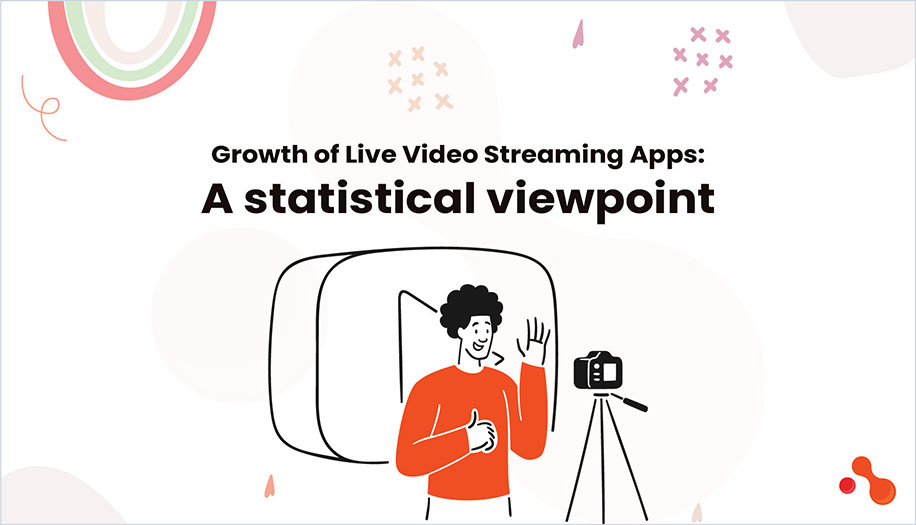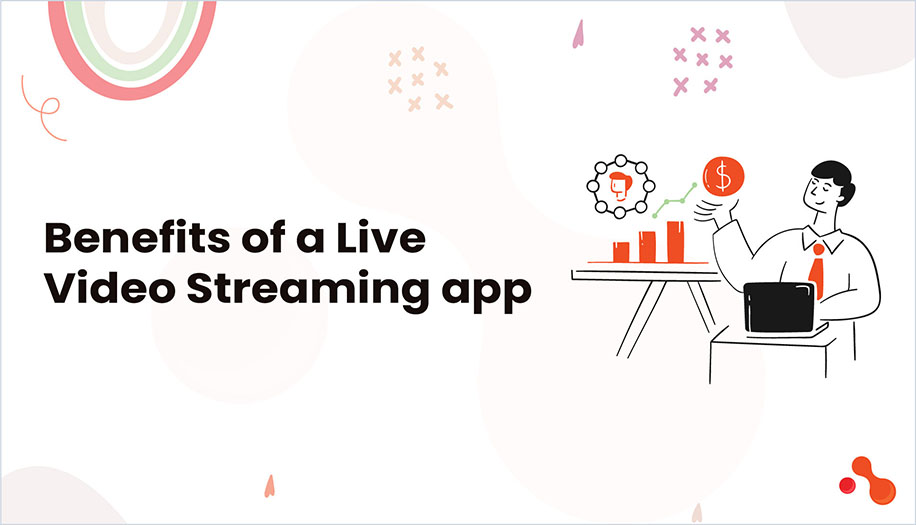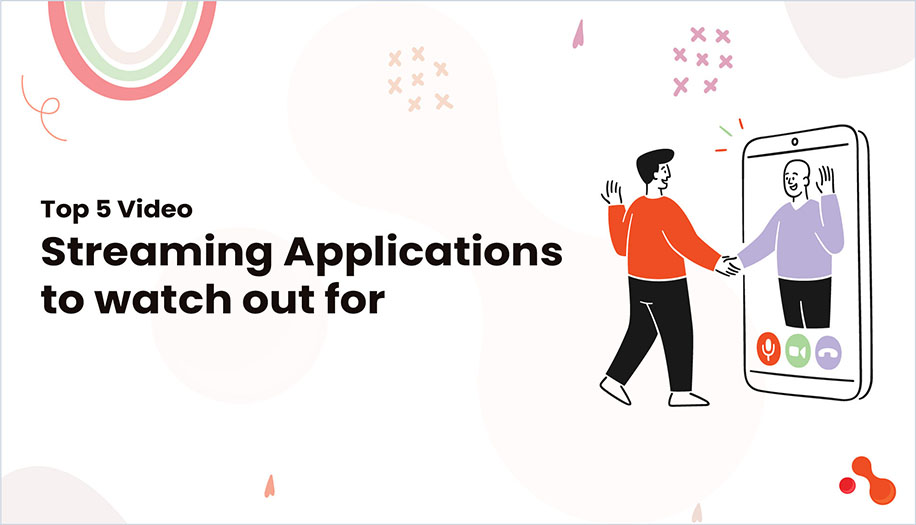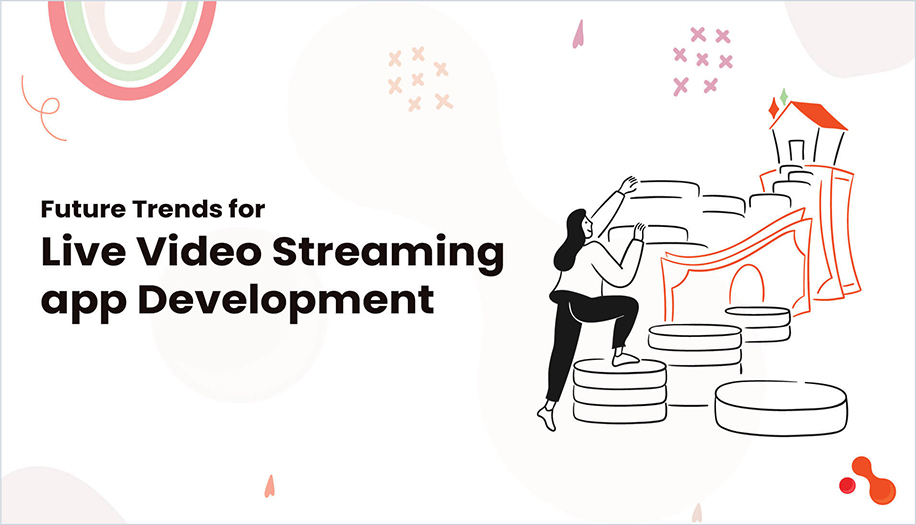Live Video Streaming app: A Complete Walkthrough
Learn how these platforms cater to diverse content preferences and offer innovative features for entertainment, education, and business.
Introduction
In the modern day business era, the universe has become more interconnected than it was before, and live streaming video apps is one the contributors in this growth. Using video streaming apps, you can connect with an audience who stays far away from you, you can also broadcast or share live events in real time, and enable a seamless face-to-face conversation across the globe.
All of this is possible within the limitations of your location by utilizing app features. Isn't that an intriguing prospect? However, have you ever given any attention to the creation of these apps? How long does it take to develop an app for live video streaming? You have, but the response eluded you. You will understand now.
In order to ensure that your work provides a flawless live-streaming experience, our comprehensive guide on live video streaming app development will walk you through the process and help you manage the complexity of app development.
Let's Begin the discussion by understanding what are Live Video Streaming apps?
What are Live Video Streaming apps?
Live video streaming app enables users to broadcast, stream and share live video content in real time on the internet. It is a widely used service for sharing various kinds of content related to entertainment, gaming, education, etc.
A user using such a service can stream content with the global audience using their camera or screen. A live streaming also enables users to send texts and give comments and reactions, thus enabling users to communicate with the broadcaster and other viewers.
In addition, a lot of apps have chat, broadcast storing, content archiving, and other features that let you save information to watch at a later time. These applications are generally accessible on desktop computers, tablets, and mobile devices, enabling users to interact and participate from a variety of platforms.
Several popular live streaming video apps include Facebook Live, Instagram Live, YouTube Live, Twitch, Periscope, and TikTok Live. With appealing features that improve the streaming experience for both broadcasters and spectators, these apps appeal to a wide audience.
Now, let us know how does the Live video streaming app is seeing the growth over time.
Growth of Live Video Streaming Apps: A statistical viewpoint

If you intend to develop your own live-streaming application, researching the market is a smart move.
Now let's examine market data for video streaming apps:
Revenue from video streaming worldwide is expected to reach $115 billion by 2026, up from a startling $82.3 billion in 2022.
With more than 2 billion active users per month, YouTube is the most widely used free video streaming service.
With 78% of homes subscribing to at least one video streaming service, the US tops the world in this regard.
At 45% of watching time, mobile devices are the most popular streaming platform, followed by TVs at 43%.
Globally, there are projected to be 8 billion subscribers to video streaming services by 2023.
With more than 200 million users globally, Netflix is the industry leader in subscription-based services.
In the US alone, an individual views 4 billion minutes of video content annually.
Because 26% of viewers claim to binge-watch at least once a week, these platforms are highly engaging.
Now, let us talk about why it is advantageous to develop a live video streaming app.
Benefits of a Live Video Streaming app

Live video streaming apps have revolutionized the way we access entertainment content by providing various benefits which have made them popular among the users from across the globe. Some of the main benefits of live video streaming apps are:
Flexible and convenient
Users that are using live video streaming apps are not committed to long-term agreements like we used to have for TV channel providers, thus enabling them to unsubscribe their subscriptions whenever they feel like it. With an easier adaptability a user can watch their preferred TV episode and movie on-demand and whenever the need arises and using any device.
This makes the video streaming apps an easily accessible source for entertainment. If this is what you need then building a remote team of developers would help you build your video streaming app.
Access from any location
Using a live video streaming app can allow you to access entertainment from any corner of the globe. Users are not just limited to certain demographic locations in order to watch their preferred TV series and movies.
These video streaming apps can be a perfect choice for travelers who are regularly traveling or staying in a remote area with few entertainment options all because of the ease of use it offers. All you need is a suitable smartphone and a dependable internet connection to access the app's content library.
Wider variety of content
Unlike traditional TV channels, which only offer a limited range of episodes and movies, users of video streaming applications have access to a vast library of content from many different genres. Choosing what to watch, whether it's a documentary, a modern TV series, or a vintage film, is made easy with a video streaming app. To further increase the variety, many video streaming applications produce their own original material.
Accessibility across devices
A user can watch their favorite series or movies on any device all because of the video streaming apps. If they are watching a movie on TV but going out or traveling somewhere they can easily switch devices and enjoy the same movie on a tablet or a phone with a single login, thus taking it off from where they paused it.
This feature makes it simple for users to enjoy their entertainment content on any device, anytime they choose.
Personalizations and recommendations
A user can get customized suggestions from these video streaming applications based on their past viewing history and interests as these apps use different algorithms that evaluate the user activity and recommend viewing shows accordingly.
This tool enhances viewers' overall viewing experience by helping them find new television shows and films that they might not have otherwise noticed.
Cost-effective
Out of all the advantages mentioned above “Cost savings” or “cost-effective” would be the most liked advantage of building a video streaming application as it offers a low-cost entertainment option. While comparing it with a traditional satellite TV subscription, a user can subscribe to the application without the need of paying for the channels that they don’t want to watch.
Additionally, in order to suit a range of budgets, the majority of video streaming apps provide several subscription options, which makes it simpler for users to watch their favored material without going over budget.
Now, further let us talk about what are different types of Live Video Streaming apps available for the users to choose from?
4 Types of Live Video Streaming apps
Video Streaming platforms have changed the way we are consuming media by offering users with easy access to a wide collection of content. The usage of these applications has increased in recent years, as a wide range of platforms are available.
Knowing about different types of video streaming apps is useful for creating a successful platform, whether it is for a production firm or a channel. The OTT industry consists of a number of video streaming applications, each of them fall under a specific category.
It is a good catch to see into these numerous areas to obtain a better idea about how to build a video streaming application. Doing this will help you discover and create features and functions which are useful for your platform.
Various kinds of video streaming applications fulfill various requirements and interests, each of them has its own set of features and benefits. Below are a few common types of video streaming applications:
On-demand video subscription (SVOD)
Users using Subscription Video-On-Demand (SVOD) apps must pay a subscription fee on a monthly or yearly basis in order to access their content library. The library has a variety of material, including TV shows, movies, and other on-demand video collections.
The subscription rates vary based on the features and caliber of the video streaming service. With SVOD apps, users may see content on several devices with just one account. SVOD apps that are well-known include Netflix, Amazon Prime Video, and Disney+.
Advertising video On-demand (AVOD)
One kind of video streaming software that allows users to watch material for free but with advertising is called Advertising Video-On-Demand, or AVOD. The platform uses the data it collects from the user's viewing history and profile to deliver customized advertisements.
AVOD platforms are popular websites like Crackle, Pluto TV, and YouTube. Users may find the free feature appealing, but the presence of adverts can be a drawback, and the money made might not be enough to maintain the creation of excellent content.
Transactional video On-demand (TVOD)
This type of video streaming service is the one in which users may purchase or rent movies or TV episodes on a pay-per-view basis by searching it from the catalog of content and pay only for the selected content that they want to view without committing to a membership.
Usually the rental term is used for a specific amount of time, like 24 hours or 48 hours within which the user can stream the content for an unlimited number of times. This access would end as soon as the rental time expires, and would require the user to rent it again if they want to re-watch it.
TVOD platforms include iTunes, Google Play, and Amazon Prime Video. TVOD is well-liked by viewers who would rather not commit to a subscription service and instead select to watch specific titles as needed.
Hybrid Video Streaming apps
Applications for hybrid video streaming combine a number of streaming techniques, including pay-per-view and subscription-based services, along with user-generated content, live streaming, and on-demand video. Consumers have flexibility in how they consume and pay for information since they have access to a wide range of content through both free and paid options.
Popular hybrid apps Hulu and YouTube TV offer a mix of free and paid content, including TVOD and SVOD options along with live TV channel viewing. People have more options and receive better value for their money when they use the hybrid strategy.
Now, further let us understand what are the top 5 Video Streaming Apps
Top 5 Video Streaming Applications to watch out for

Youtube
MAUs: 2.2 billion
Users in total: 2.6 billion users in total
Platforms: Desktop, Android, and iOS
It's ironic that YouTube is seen as a widely used social media platform. It is disastrous in the video streaming market because of its live broadcast feature. When it comes to internet video streaming, Youtube now has the largest user base. 2.2 billion people, or more than 25% of the global population, use YouTube each month.
Netflix
MAUs: 209.18 million
Users in total: 220.67 million
Platforms: Desktop, Android, and iOS
Netflix is the second-most popular video streaming service worldwide, offering users access to an endless stream of critically acclaimed TV series, documentaries, animation, and movies whenever they want. Users must first activate monthly or annual memberships based on their needs from price options in order to stream content online.
Amazon Prime Video
MAUs: More than 175 million
Users in total: 200+ million users in total
Platforms: Desktop, Android, and iOS
Another well-liked online video streaming service that rivals Netflix is Amazon Prime Video, which is provided by Amazon.com Inc. and allows users to access and download their preferred films, TV series, web series, documentaries, and much more. Furthermore, it positions HBO, Showtime, and other major streaming service providers next to top programming.
Twitch
MAUs: 140 million
Total Users: Not Available
Platforms: Desktop, Android, and iOS
For gamers and streamers specifically, Twitch is a streaming platform. Twitch's popularity can be attributed to its live streaming, esports competition broadcasting, player education, and interactive features. Video streaming app development companies are assisting clients by creating live stream apps similar to Twitch, since the gaming community on the platform has grown.
Disney+
MAUs: Not available
A total of 137.7 million users
Platforms: Desktop, Android, and iOS
Disney Plus, a media streaming service owned by Walt Disney, gives it an advantage over rival streams. Due to the fact that it offers a reasonably priced plan for streaming content on its glossary, it is well-known for being a low-cost video streaming app. As of the second quarter of 2022, Disney+ had 137.7 million customers globally, according to a recent survey.
After knowing the Top 5 Video Streaming Applications let us learn about the features that a video streaming app should have.
Live Video Streaming Apps: It’s Features
Understanding video streaming is an intriguing topic.
Numerous elements are included in an efficient video streaming app to enable individualized content distribution, interactive encounters, and overall fantastic enjoyment.
The characteristics of a video streaming app are listed below, which you may progressively consider using in your idea for a video streaming app development.
Let us understand all the features at length
Register
Numerous programs for streaming videos online allow users to sign in with social media credentials.
User profile
Allow end users of the program to add different profiles so they can quickly manage personal preferences.
Talk
Include a chat function for dedicated streaming and broadcasting to enable instantaneous communication between the streamer and the viewers.
Search
Allow users to stream for enjoyment by entering their preferred content in the search window.
Subscription
Select this option if you wish to use price schemes to generate income. like Prime Video, Netflix, and other services.
Downloads
Give customers the option to download and view content at a later time to enhance the interactive experience.
Assessing
Give users a space to share their opinions and comments on the video.
Multiple languages
Because users are unique, your video streaming software should also have multilingual functionality.
Configurations
A special page for managing, tracking, and controlling login, password protection, and other fundamental user preferences.
Now, further let us understand a few advanced features of a live Video Streaming app
Suggestion
By giving consumers pertinent content based on their viewing interests and history, you may offer customisation.
Chatbots with AI
AI chatbots are excellent at responding to consumers' inquiries, from simple to complex.
Computational Intelligence
If at all possible, include cutting-edge technology into your app to give users a rich, intuitive experience.
Now, further let us understand the Future trends in Live Video Streaming app Development.
Future Trends for Live Video Streaming app Development

The live video streaming industry is changing every second, moving to the forefront on the backs of technology and changing user requirements. A few of the trends and innovations that may shape the future of live video streaming are discussed below:
Virtual and Augmented Reality Integration
The integration of VR and AR into live streaming apps is set to increase the quality of user experience through immersive and interactive content. For example, virtual concerts would make viewers feel like part of the audience, or education streams where AR would help in the visualization of complex information.
Artificial Intelligence and Machine Learning
The role of AI and ML in having a smoother content curation and User Experience has gained a lot of attention lately. It can help in the personalization of recommendations as per user behavior, stream quality optimization depending on bandwidth availability, even real-time content moderation to see that community guidelines are followed.
5G Technology
The long-awaited 5G technology is going to assist in live video streaming by reducing latency nearly to real time and at the same time, with enhanced mobile internet connections, give quite high speed and stability. This would provide features such as higher quality streams, greater reliability of connections, and the possibility of streaming high-definition content on mobile devices without buffering.
Interactive and Social Broadcasting
Indeed, live streaming services are integrating increasingly more features of social media, further enabling viewers to engage themselves more deeply with content creators and other viewers. This involves live polling, audience reactions, shared viewing experiences, and all such activities that allow passive viewing to become an active social event.
Advanced analytics
Advanced analytics capabilities will let content creators and owners of platforms infer more about viewer inclinations and patterns of engagement. This would, in turn, help in working out more effective content strategies and advertising models that not only enhance user satisfaction but also improve profitability.
Before jumping and learning about how to build a video streaming app and knowing its cost let us talk about the Use Cases of a Live Video Streaming App
Use Cases of Video Streaming App
Educational
Live Webinars: Live workshops, webinars, and classes for education are all possible for educational institutions, and they enable remote learners to participate in real time.
On-Demand Learning: Students and professionals have access to recorded video lectures and tutorials at any time, offering them flexible learning opportunities.
HealthTech Telemedicine and Virtual Consultations
Virtual Consultations: By enabling real-time video consultations, medical professionals can effectively provide remote healthcare services to patients.
Health Education and Training: Medical professionals can use recorded films as instructional materials, training sessions, and for health education.
Entertainment
Entertainment Live Events and Performances: By providing live streaming of concerts, plays, and athletic events to a worldwide audience, entertainment venues can boost spectator engagement and accessibility.
On-Demand Films and TV Series: To accommodate a wide range of entertainment tastes, recorded films, TV shows, and performances may be made available for on-demand watching.
Enterprise and Corporate Communication
Internal Meetings and Trainings: Companies can broadcast live corporate events, training sessions, and internal meetings to encourage interaction and cooperation among staff members.
Company Updates and Announcements: To guarantee uniform communication throughout the company, recorded videos might be utilized for CEO speeches, company announcements, and employee training courses.
Faith and Spiritual
Live Religious Services: To encourage community involvement, churches, temples, and other religious institutions can stream live sermons, ceremonies, and religious services to communities that are far away.
On-Demand Spiritual direction: Those seeking spiritual direction and contemplation can see pre-recorded videos featuring sermons, spiritual lectures, and motivational messages.
These use cases show how apps for recorded and live video streaming may benefit a range of sectors and industries, improving community participation, education, communication, and entertainment.
Now, further let us learn about the best Tech Stack you should use for building a Live Video streaming app
Tech Stack for Building Live Video Streaming App
Component | Description | Suggested Tech Stack | Estimated Cost (USD) |
Frontend | User interface and experience | React Native, Flutter, HTML5, CSS3, JavaScript | $50,000-$100,000 |
Backend | Server-side logic and API | Node.js, Python (Django, Flask), Ruby on Rails | $75,000-$120,000 |
Database Management | Data storage and retrieval | PostgreSQL, MongoDB, MySQL | $15,000-$30,000 |
Cloud and Server Infrastructure | Hosting and scaling | AWS, GCP, Azure | $30,000-$60,000 |
Content Delivery Network (CDN) | Content distribution | AWS CloudFront, Akamai, Cloudflare | $15,000-$30,000 |
Media Transcoding and Storage | Video processing and storage | AWS Elemental MediaConvert, Zencoder, S3 | $40,000-$60,000 |
Payment Gateway Integration | Payment processing | Stripe, PayPal, Authorize.Net | $15,000-$25,000 |
Analytics and Reporting Tools | User behavior and performance metrics | Google Analytics, Firebase, Mixpanel | $15,000-$25,000 |
After deciding on choosing the right tech stack let us finally learn about how we can develop a Live Video Streaming app?
How can we develop a Live Video Streaming app?
Market Research
Effective market analysis is the foundation of any profitable app. Finding trends, rivals, and possible market gaps are all part of this. Tailoring your app to the correct audience requires understanding the platforms people use, the types of content they want, and the need for video streaming services.
Describe the USP and target audience.
After conducting a market analysis, precisely identify your target market. Take into account variables such as demographics, age, hobbies, and viewing preferences. Creating a unique selling proposition (USP) will help set your app out from the competition.
This might be an exclusive market, excellent content, cutting-edge features, or an improved user interface.
Choosing a right model
Subscription costs, advertising, freemium (free with premium features), and transactional video-on-demand (TVOD) are examples of common business models.
Take into account your target market, the cost of acquiring content, and the competitive environment when making this choice.
Strategy for Content Acquisition
The foundation of any successful video streaming software is its content. Create a solid content acquisition approach that complements your business plan and target market. This could entail collaborating with content creators, producing original material, or licensing content from producers.
UI and UX Design
It is critical to have a flawless user interface (UI) and a remarkable user experience (UX). In addition to being aesthetically pleasing and screen-size-optimized, the design should be intuitive. Prioritize simple navigation, quick loading times, and tailored suggestions to increase user happiness.
Developing Core features and functionality
In this step it is essential to develop core features like video playback, search, user profiles and content discovery. Moreover, building additional features like live streaming, social sharing, offline viewing are a few more essential features. At this step, it is important to prioritize features based on target audience and business goals.
Apply Security Measures
It's critical to safeguard user data and make sure rules are followed. Put strong security measures in place to protect user data and stop illegal access. Respect content limits and copyright rules to stay out of trouble with the law.
Test and Debug Thoroughly
Thorough testing is necessary to find and address bugs prior to release. To guarantee peak performance, thoroughly test various hardware configurations, operating systems, and network environments. User testing can yield insightful criticism for advancements.
Launch and Promotional Plan
Create a thorough launch strategy to pique interest and draw users. To reach your target audience, make use of marketing channels including influencer relationships, social media, app store optimization (ASO), and paid advertising.
Updates and Post-Launch Maintenance
Maintaining long-term success requires constant improvement. To find areas that need improvement, track app store ratings, statistics, and user feedback. To keep users interested, update the app frequently with fresh features, updated information, and performance improvements.
Now, let us talk about how much does it Cost to develop a Live Video Streaming App
Cost to Develop a Live Video Streaming App
While developing a live video streaming app, a number of expenses must be carefully taken into account as they can have a big impact on the total cost.
The choice of technology, feature complexity, design specifications, backend infrastructure, third-party integrations, development team, continuous maintenance and support, marketing initiatives, and adherence to legal and regulatory requirements all influence these expenses.
Every one of these elements is vital to the development process and can significantly affect the overall cost. Let see the detail cost analysis based on various factors in the below given table
Factor | Description | Estimated Cost Range |
Platform Choice | - Native (iOS & Android separately) - Cross-platform (shared codebase) | - $15,000 to $50,000 per platform - $20,000 to $60,000 |
Feature Complexity | - Basic (user login, simple streaming) - Advanced (interactive, analytics, AI) | - $5,000 to $20,000 - $20,000 to $50,000+ |
Design and User Experience | - Custom UI/UX design - Standard UI/UX using templates | - $10,000 to $25,000 - $3,000 to $10,000 |
Backend Infrastructure | - Scalability needs - Advanced data management and security | - $10,000 to $30,000 - $5,000 to $15,000 |
Third-Party Integrations | - Payment gateways - CDN and cloud services | - $2,000 to $5,000 per service -$1,000 to $5,000/month |
Development Team | - Based on geographical location - Expertise level | - Varies widely - $50 to $250 per hour |
Maintenance and Support | - Ongoing updates and server management - 24/7 customer support | -$1,000 to $5,000/month - $2,000 to $10,000/month |
Marketing and Promotion | - Launch strategies and campaigns - Branding and promotional materials | - $5,000 to $20,000 - $2,000 to $10,000 |
Legal and Regulatory Compliance | - Licensing costs - Compliance with data protection and broadcasting laws | - $2,000 to $10,000 - $3,000 to $15,000 |
Total Estimated Cost
Combining all these factors, the total cost to develop a live video streaming app can still vary greatly, usually ranging from $20,000 to over $100,000, depending on the specific requirements, scale, and quality expectations.
After learning about the cost in detail, the next question would be how much time is required to develop a Live Video Streaming app?
How much time is needed to develop a Live Video Streaming app
Are you curious how long it will take to develop an app for streaming videos?
A thorough analysis of the amount of time required to develop an app and the variables that influence it are provided in the table format below.
Areas | Features | Complexity | Estimated Time (Weeks) |
Core Functionality | User management & authentication | Low | 1-2 |
Video playback & search | Medium | 2-4 | |
Content Management System (CMS) | Medium | 3-5 | |
Basic chat & comments | Low | 1-2 | |
Monetization | Subscriptions & in-app purchases | Medium | 2-3 |
Advertising integrations | Medium | 2-3 | |
Pay-per-view functionality | Medium | 2-3 | |
Live streaming | High | 4-6 | |
Advanced Features
| Social sharing & recommendations | Medium | 2-3 |
Advanced analytics & reporting | Medium | 2-3 | |
Multilingual support | Medium | 2-4 | |
Additional factors
| App platform (native vs. hybrid) | N/A | +1-2 weeks for native |
Design complexity | N/A | +1-2 weeks for complex design | |
Team size & experience | N/A | Faster with larger, experienced team | |
Quality assurance & testing | N/A | 1-2 weeks |
But is there any way to monetize the video streaming app? Yes, an organization can easily monetize a video streaming app. We’ve mentioned a few ways below:
5 Ways to Monetize Video Streaming apps
Apps that stream videos can be monetized in a number of ways. We will cover just that in this section of the guide on creating a video streaming app.
Let's dive straight in:
Model based on subscriptions
Ads that stream videos are most often monetized using a subscription-based business model.
Under this model, users have to pay a charge on a monthly or annual basis to access the platform's content. This is beneficial for apps that provide customers with premium or exclusive content that they can't get anywhere else.
Model with ads
Using advertisements is another method of making money off of a video streaming service. Ad-supported models give customers access to free content in exchange for playing advertisements.
Because this app monetization model enables advertisers to target a specific demographic, it is most effective for apps with a huge user base and high levels of engagement.
Pay-per-view Model
One of the most well-liked methods for monetizing apps is perfect for live events or premium content that consumers are prepared to pay for.
Instead of purchasing a platform subscription, users can pay for certain events or bits of content using the pay-per-view (PPV) model.
The freemium business model
Users can choose between free and paid content with the freemium model. While premium features and more content are accessible for a subscription, basic features and a restricted quantity of content are provided for free.
With this combination, customers will be able to test the app before deciding to subscribe, and the app will continue to make money via paid upgrades.
Sponsorship and Product placement
Certain video streaming applications generate revenue via product placements and sponsorships in addition to conventional advertising.
Because it enables marketers to target a certain demographic, it is therefore beneficial for apps that serve a specialized market or have a devoted user base.
How can Acquaint Softtech help?
Acquaint Softtech is an IT outsourcing company based in India, we offer software development outsourcing and IT staff Augmentation services to our clients. Skill scarcity has become a pressing issue that’s what has made us aim at helping businesses hire remote developers to build their Remote team of App developers.
Moreover, we’re an official Laravel Partner, offering the companies a luxury to hire Laravel developers, hire MEAN Stack developers and Hire MERN stack developers for as little as $15/hour and you can onboard them in less than 48 hours to avoid any delays in your app development process.
Conclusion
In conclusion, live-streaming applications offer a great means for individuals to maintain social connections and share their experiences with a global audience. Developers can construct a live-streaming application that offers viewers an interactive and captivating experience in just a few easy steps.
You can get in touch with a live streaming app development company with experience, such as Acquaint Softtech. They may assist you at every step to ensure that an app lives up to your standards. You have options ranging from professional guidance to hiring specialized developers for your streaming app.
Why hold off? Get in touch with us to hire remote developers!
Table of Contents
Get Started with Acquaint Softtech
- 13+ Years Delivering Software Excellence
- 1300+ Projects Delivered With Precision
- Official Laravel & Laravel News Partner
- Official Statamic Partner

